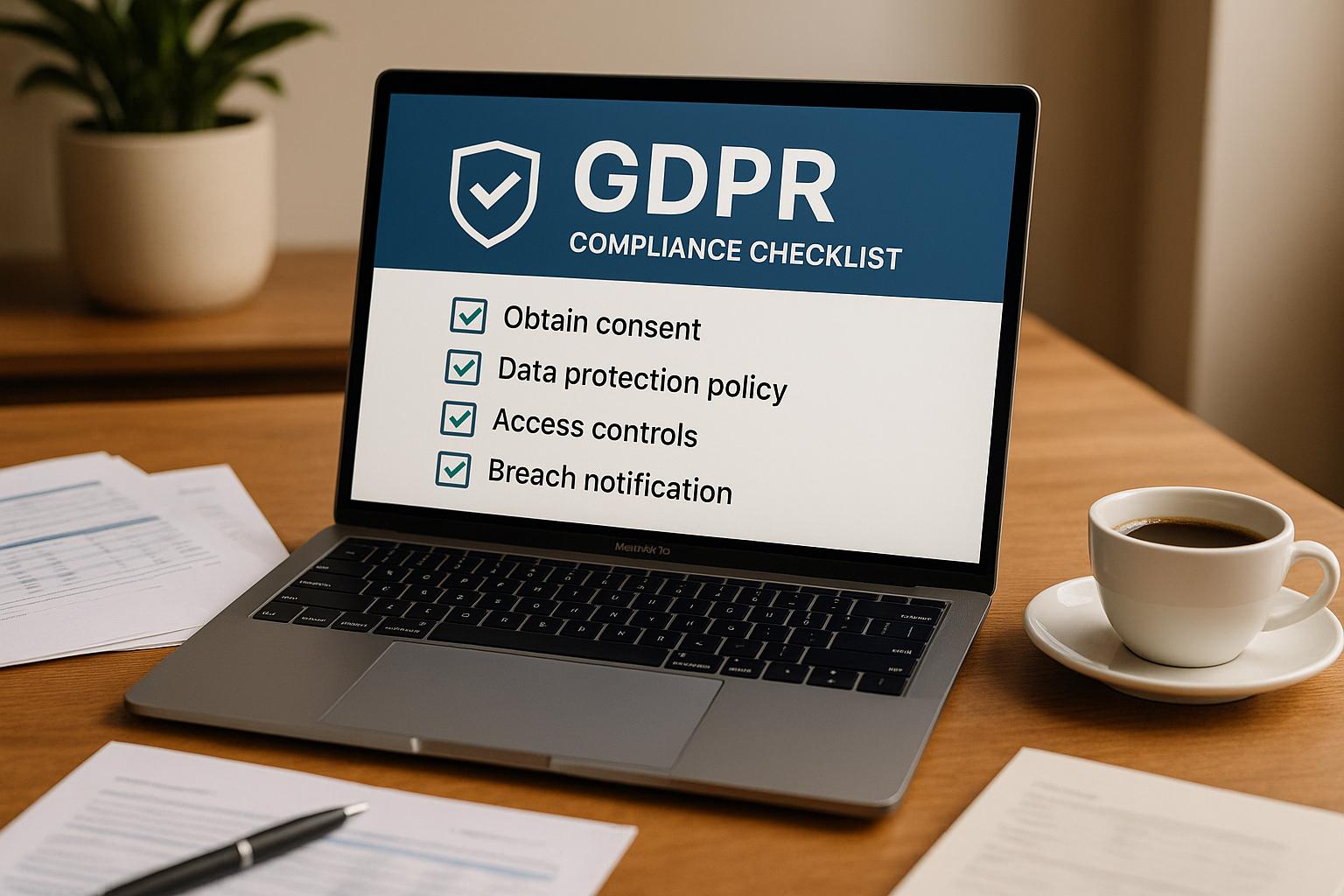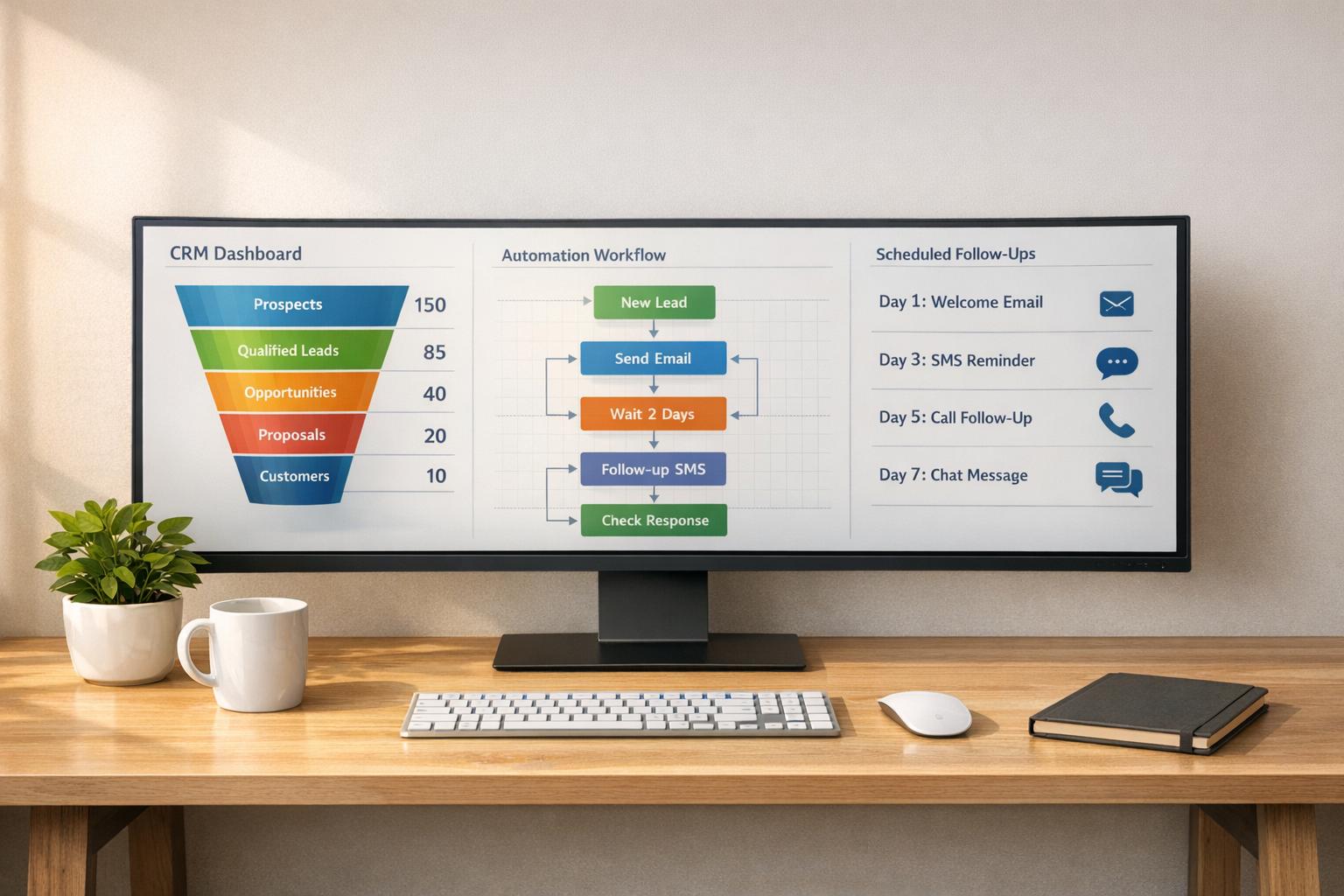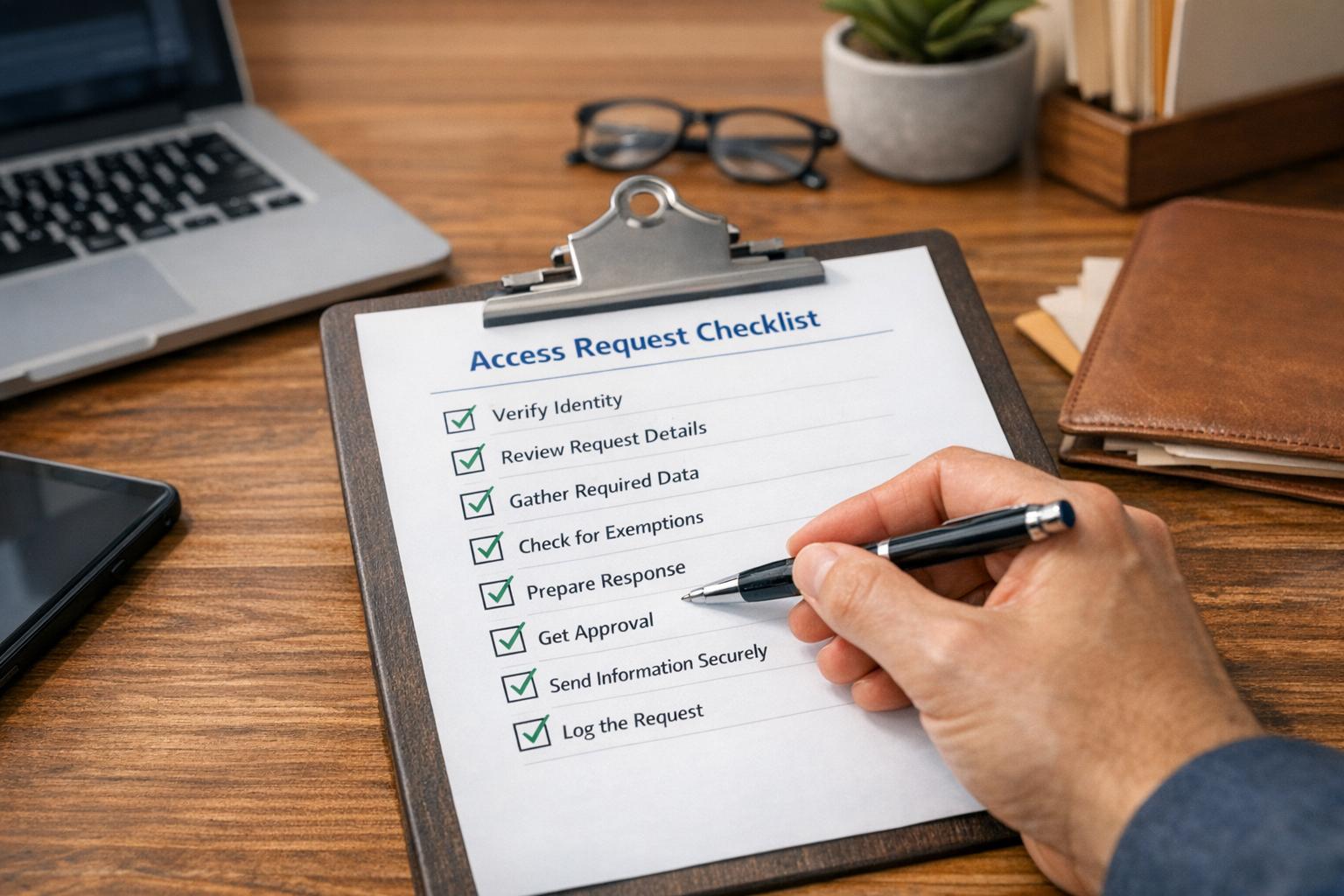E-Commerce Vendor Compliance: GDPR Checklist

GDPR compliance is critical for e-commerce businesses handling EU customer data. Non-compliance risks fines up to €20 million or 4% of annual revenue. But beyond avoiding penalties, meeting GDPR standards builds trust with privacy-conscious customers. Here's what you need to know:
- Understand GDPR Scope: Applies to any business processing EU residents’ data, including names, emails, IPs, and payment details.
- Vendor Accountability: You’re responsible for third-party vendors’ compliance, such as payment processors or marketing platforms.
- Key Principles: Limit data collection, use it only for specific purposes, secure it, and ensure accuracy.
- Support Customer Rights: Allow access, corrections, deletion, and data portability upon request.
- Vendor Checklist:
- Map data flows and identify vendors handling personal data.
- Verify vendor compliance through privacy policies, certifications, and audits.
- Sign Data Processing Agreements (DPAs) outlining responsibilities.
- Regularly monitor and document vendor compliance practices.
Assign a compliance lead, use tools for data management, and train staff to handle GDPR processes. Following these steps ensures legal compliance while fostering customer confidence.
Understanding GDPR Compliance for Online Stores
Main GDPR Requirements for Vendor Compliance
To manage vendor risks effectively, e-commerce businesses must ensure that third-party vendors comply with the General Data Protection Regulation (GDPR). These requirements are pivotal for safeguarding customer data and maintaining compliance. By understanding the key GDPR obligations, businesses can evaluate vendors more effectively and uphold strong data protection practices.
Legal Basis for Data Processing
Once vendor risks are identified, it’s essential to confirm that each vendor has a valid legal basis for processing data. GDPR mandates that businesses document one of several legal justifications before beginning any data processing. Common legal bases in e-commerce vendor relationships include consent, contractual necessity, legal obligation, and legitimate interests.
For instance, in typical e-commerce operations, contractual necessity applies when processing a customer’s shipping address for delivery or credit card details for payment. For marketing activities, vendors must obtain consent that is freely given, specific, informed, and revocable at any time.
When vendors handle regulatory checks, such as tax compliance or anti-money laundering, data processing must fall under a legal obligation. It’s critical to document and review the legal basis for each vendor’s data processing to ensure transparency and accountability.
After documenting the legal justifications, confirm that vendor practices align with GDPR’s core data protection principles.
Data Protection Principles
Vendors must adhere to GDPR’s key principles when managing personal data. These principles are designed to ensure data is handled responsibly and securely.
- Data Minimization: Vendors should only collect the information necessary for a specific purpose. For example, a shipping provider needs a customer’s name, address, and phone number but doesn’t require additional details like email preferences or browsing history.
- Purpose Limitation: Vendors must use data solely for agreed-upon purposes. Clear contracts and regular audits can help prevent unauthorized use.
- Data Security: Vendors are required to implement measures like encryption, access controls, and regular system updates. For example, in 2023, WC Vendors enhanced GDPR compliance for multi-vendor platforms by integrating Stripe Connect for automated payments, role-based management, and secure order data storage. This led to a 41% decrease in unauthorized data access incidents over a year.
- Accuracy: Vendors must maintain up-to-date records and correct any errors promptly. If a customer updates their shipping address, vendors should ensure all systems reflect the change immediately.
- Storage Limitation: Personal data should not be retained indefinitely. Vendors must establish clear retention policies that align with legal and business requirements.
Supporting Data Subject Rights
Beyond operational safeguards, vendors must empower customers to exercise their GDPR rights effectively. These rights ensure customers have control over their personal data, and vendors must have robust systems to handle such requests.
- Right of Access: Customers can request copies of their personal data and details about its usage. Vendors need efficient processes to retrieve and share this information promptly.
- Right to Rectification: When customers identify inaccuracies in their data, vendors must update all systems to reflect the corrected information.
- Right to Erasure (Right to Be Forgotten): Vendors must delete customer data upon request unless a legal obligation requires retention. Data processing agreements (DPAs) should outline how deletion requests are handled and confirm when data removal is complete.
- Data Portability: Customers are entitled to receive their data in a structured, machine-readable format, such as CSV or JSON, enabling easy transfer to another service.
In 2023, Omnisend reported that e-commerce businesses implementing clear consent mechanisms experienced a 27% drop in customer complaints related to data privacy. Vendors must be prepared to process these requests within one month, using established protocols instead of ad-hoc solutions.
To ensure compliance, DPAs should clearly define vendor responsibilities for supporting customer rights and outline effective processes for handling data-related requests.
GDPR Vendor Compliance Checklist
Now that you’ve got a handle on the core GDPR requirements, it’s time to put them into practice. This checklist will guide you through evaluating your vendors to ensure they meet GDPR standards. In 2023, over 60% of e-commerce businesses reported struggles with third-party vendor compliance, often citing transparency issues and inconsistent data protection practices.
Map Your Data
Start by compiling a detailed inventory of all personal data within your business. Document what types of data are processed, why they’re used, who has access, and where they’re stored. For instance, shipping vendors only need delivery details, while payment processors require billing information but not shipping addresses.
Create a thorough record that traces data from collection to deletion. Identify which vendors handle specific data, the legal reasons for sharing it, and how long they retain it. This process can uncover previously unnoticed data flows, giving you a clearer picture of your data landscape.
Check Vendor Compliance
Once your data flows are mapped, assess whether your vendors follow the necessary processes. Before entering into any partnership, confirm their GDPR compliance. Review their privacy policies, check for certifications like ISO 27001, evaluate their data protection history (including any past breaches), and ensure they have strong technical and organizational safeguards in place.
Ask vendors for specific documentation, such as their data protection policies, security certifications, and evidence of GDPR training for their staff. Learn about their procedures for managing data subject requests and handling incidents. Vendors should clearly demonstrate how they support data subject rights, including access, correction, and deletion.
Don’t just take their word for it - verify their records and regulatory history independently. A vendor with a history of security lapses may not be a reliable partner, no matter how polished their current policies appear.
Create Data Processing Agreements (DPAs)
Any vendor processing personal data from EU/EEA residents must sign a detailed DPA. This agreement should define the scope and purpose of data processing, specify the types of data involved, and outline each party’s responsibilities under GDPR. It must also require vendors to implement strong security measures and include provisions for supporting data subject rights.
The DPA should address breach notification procedures and the vendor’s obligations to assist with audits. It should explicitly state that vendors can only process data for agreed purposes and are prohibited from sharing it with unauthorized third parties.
Termination clauses are essential - vendors must delete or return all personal data when the relationship ends. This step ensures data doesn’t linger in vendor systems unnecessarily.
Monitor Vendor Compliance
Compliance isn’t a one-and-done task. It requires ongoing oversight to adapt to changes in business operations and vendor relationships. Regular audits, periodic reviews of vendor practices, and compliance reports are crucial for maintaining GDPR adherence.
Set up automated alerts and schedule routine reviews of vendor contracts and data flows. During these reviews, confirm that vendors are sticking to the agreed-upon practices and haven’t introduced new risks.
Consider using compliance management tools to make this process more efficient. These tools can track certifications, send renewal reminders, and flag potential issues before they escalate.
Document All Compliance Work
Keep detailed records of all compliance activities. This includes vendor assessments, signed DPAs, audit reports, consent logs, data mapping inventories, and any compliance-related communications or incidents. Maintaining an up-to-date Record of Processing Activities (ROPA) is also highly recommended to demonstrate compliance during audits.
Store all documentation in a centralized, secure location that authorized team members can access. This becomes especially important if regulators request proof of your compliance efforts. In 2022, the average GDPR fine for non-compliance was around $1.2 million, with third-party data breaches being a major contributor to enforcement actions.
Create a filing system to track each vendor’s compliance journey - from initial assessments to ongoing monitoring. Include timestamps for all actions and maintain version control for updated agreements or policies.
sbb-itb-5f36581
Tools and Methods for Managing Vendor Compliance
Once you've outlined the key steps for GDPR vendor compliance, the next move is to put reliable tools and methods in place to maintain smooth, ongoing oversight. These strategies bring your compliance checklist to life, ensuring GDPR requirements are met consistently throughout your vendor relationships. The goal? To shift from a reactive, ad-hoc approach to a structured system that keeps everything organized and up-to-date.
Assign a Compliance Lead or Team
Assigning a dedicated person - or even a team - to handle vendor compliance is critical for establishing clear accountability. This role becomes the go-to for all data protection activities involving vendors, from initial assessments to continuous monitoring.
A compliance lead is responsible for overseeing vendor data practices, managing Data Processing Agreements (DPAs), and acting as the point of contact for data subject requests . They also coordinate staff training and work closely with vendors to ensure that proper technical and organizational safeguards are in place.
For larger e-commerce businesses, forming a small compliance team can be a smart move. This team can provide additional support, covering areas like technical security, legal agreements, and vendor management, while ensuring no single person is overwhelmed.
Leverage Tools for GDPR Compliance
Strong leadership is essential, but pairing it with the right tools makes compliance management much more efficient. Automated tools can simplify workflows, minimize manual errors, and create reliable audit trails - far more effective than juggling spreadsheets and email chains.
When choosing tools, look for features like consent management, data mapping, and secure document storage. For example, Reform’s no-code form builder allows you to create branded forms to collect vendor attestations, apply conditional routing, track analytics, and integrate with CRM systems.
Other helpful tools include secure document management systems, automated reminders for contract renewals, and platforms that log compliance activities for easy auditing. These systems take the headache out of vendor compliance, turning it into a manageable, streamlined process.
Train Your Staff Regularly
Regular training ensures your team understands GDPR basics and can effectively collaborate with third-party vendors .
Training sessions should cover essential topics like data protection principles, the importance of vendor compliance, and the steps for handling data subject requests and vendor communications. Employees should learn how to spot potential risks and know exactly who to contact if issues arise.
Practical scenarios are particularly useful for training - think verifying vendor compliance documentation or managing requests for additional data access. It's also crucial that staff grasp the distinction between data controllers and processors, as this knowledge is key to managing vendor relationships effectively.
As regulations and tools evolve, update your training materials and hold quarterly refreshers to address new compliance challenges. Be sure to document all training activities as part of your compliance records to demonstrate your commitment to protecting data.
Conclusion: GDPR Compliance for E-Commerce Success
Ensuring GDPR vendor compliance isn’t just about meeting legal requirements - it’s a way to safeguard your business and earn your customers' trust. With fines reaching up to €20 million or 4% of annual global turnover, the stakes are high. In 2022, GDPR fines totaled over €2.92 billion, with the e-commerce and tech sectors being among the hardest hit.
Key Points
Successful vendor compliance relies on three essential pillars: thorough due diligence, strong Data Processing Agreements (DPAs), and continuous monitoring. These elements should guide every vendor relationship and form the foundation of your compliance checklist. This checklist - covering data mapping, compliance verification, and ongoing oversight - should be a dynamic tool that evolves with your business.
- Due diligence involves assessing technical safeguards, certifications, and data practices. A 2023 survey found that 67% of U.S. companies serving EU customers updated their vendor contracts to include GDPR-compliant DPAs.
- DPAs are legally binding agreements that outline vendor responsibilities and protect data subject rights. These agreements must be reviewed regularly to reflect any changes in your operations.
- The tools you use can streamline compliance. For instance, Reform’s no-code form builder helps you create branded forms for vendor attestations, apply conditional routing, and integrate seamlessly with your CRM. This simplifies compliance while maintaining a clear audit trail.
Adopting transparent privacy practices also has tangible benefits. For example, 45% of e-commerce businesses reported increased customer trust after implementing such practices. GDPR compliance, therefore, is not just about avoiding fines; it’s a way to build stronger, more trustworthy relationships with your customers.
These three pillars create a solid compliance framework, empowering you to take immediate and effective action.
Next Steps for E-Commerce Vendors
Start by auditing your vendor relationships. Identify which vendors handle EU customer data and ensure proper DPAs are in place. If any gaps are found, address them promptly - proactive compliance costs far less than penalties.
Review your privacy policies to ensure they’re easy to find and written in plain language that resonates with both U.S. and EU customers. Consider expectations around privacy and transparency, and use U.S. conventions (like MM/DD/YYYY dates and USD currency) for formatting while staying aligned with GDPR standards.
Assign a dedicated compliance lead or team to oversee these efforts. Regular training sessions, quarterly vendor reviews, and automated tools can help integrate compliance into your daily operations. Remember, GDPR compliance isn’t a one-time task - it’s an ongoing process. But with the right approach, it can become a competitive edge that helps your e-commerce business stand out.
FAQs
What steps can e-commerce businesses take to ensure their third-party vendors comply with GDPR regulations?
To ensure that third-party vendors adhere to GDPR regulations, e-commerce businesses should take a step-by-step approach:
- Assess Vendors Thoroughly: Check if vendors have strong data protection measures like encryption, secure storage, and strict access controls in place.
- Establish Data Processing Agreements (DPAs): Create agreements that clearly define how vendors will handle personal data while staying GDPR-compliant.
- Regular Monitoring and Audits: Periodically review vendor practices and request proof of compliance to ensure everything stays on track.
- Give Clear Guidelines: Provide detailed instructions on how vendors should process data in line with your privacy policies and GDPR standards.
These measures help businesses reduce risks and safeguard customer data effectively.
What are the main GDPR data protection principles e-commerce vendors need to follow?
Under the GDPR, e-commerce businesses partnering with third-party providers must follow strict data protection principles to stay compliant. Here's what that means in practice:
- Lawfulness, fairness, and transparency: Data must be processed in a legal, transparent manner that respects individuals' rights.
- Purpose limitation: Collect data only for clear, specific, and legitimate purposes.
- Data minimization: Gather only the information absolutely necessary for the task at hand.
- Accuracy: Keep personal data accurate and ensure it’s regularly updated.
- Storage limitation: Retain data only as long as it's needed for its original purpose.
- Integrity and confidentiality: Use robust security measures to protect personal data from unauthorized access, loss, or damage.
Additionally, e-commerce companies should keep detailed records of their vendors' compliance efforts. Contracts with third parties should include GDPR-specific terms to ensure customer data is handled securely and responsibly.
Why should e-commerce businesses regularly track and document vendor GDPR compliance?
Regularly monitoring and documenting how vendors comply with GDPR is a smart move for e-commerce businesses. It helps protect customer data, maintain trust, and steer clear of hefty legal penalties. Ensuring that third-party vendors stick to GDPR rules significantly reduces the risks tied to data breaches or non-compliance.
Keeping detailed records also shows that your business is accountable and ready to handle audits or regulatory questions. This not only protects your reputation but also keeps your operations running smoothly.
Related Blog Posts
Get new content delivered straight to your inbox

The Response
Updates on the Reform platform, insights on optimizing conversion rates, and tips to craft forms that convert.
Drive real results with form optimizations
Tested across hundreds of experiments, our strategies deliver a 215% lift in qualified leads for B2B and SaaS companies.


.webp)



